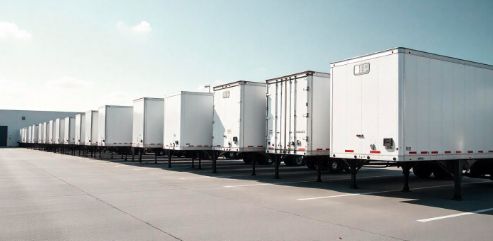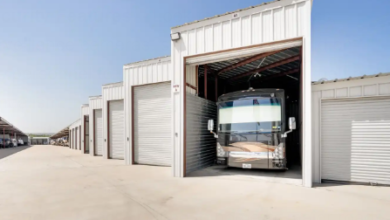Shipping Trailers for Business: How to Move Commercial Trailers Efficiently

Moving commercial trailers is an essential task for many businesses—whether it’s transporting equipment, delivering goods, or relocating fleet assets. Doing it right means balancing speed, cost, safety, and reliability. With various trailer types, transportation methods, and logistical challenges to consider, businesses need a clear strategy to ship trailers efficiently and cost-effectively.
What’s Inside:
1. Ship Smarter, Not Harder – Learn how to move flatbeds, reefers, goosenecks & more using the best method for your needs—tow-away, flatbed, rail, or sea freight.
2. Choose the Right Transport Partner – Get tips on picking a trusted, insured carrier or broker, asking the right questions, and avoiding hidden fees.
3. Prep, Protect & Track – Follow a checklist to avoid costly delays, understand insurance, and use GPS tracking to stay in control.
In this article, we break down everything you need to know about commercial trailer shipping: from understanding trailer types and transportation options, to planning routes, meeting regulations, and leveraging technology. Whether you’re a small business or a national operation, this guide will help streamline your trailer logistics and help you confidently ship a trailer without hassle.
Types of Commercial Trailers Commonly Shipped
Image Credit Goes to FreePik
Before selecting a shipping method, it’s important to identify what type of trailer you’re transporting. Common types include:
- Flatbed Trailers – Used for heavy, oversized, or irregular loads. These trailers are open and versatile but require proper securement and weather consideration.
- Enclosed Cargo Trailers – Offer protection from weather and theft; suitable for valuable or fragile cargo.
- Refrigerated Trailers (Reefers) – Maintain controlled temperatures, ideal for perishable goods such as food or pharmaceuticals.
- Utility Trailers – Compact and lightweight, used for smaller cargo, landscaping equipment, or short-haul operations.
- Gooseneck Trailers – Designed for heavy-duty loads and superior stability. Often used in construction or agriculture.
Knowing your trailer type and its dimensions is essential when requesting quotes or planning transport logistics.
Main Trailer Shipping Methods
Image Credit Goes to FreePik
Businesses can choose from several transportation options depending on distance, urgency, budget, and load size.
1. Road Transport
Road transport is the most commonly used method for shipping trailers:
- Tow-Away Service: A transport company hooks up your trailer and drives it to the destination. Ideal for trailers that are in good condition and roadworthy.
- Flatbed or Lowboy Hauling: If the trailer isn’t roadworthy or if it’s oversized, it can be loaded onto a flatbed truck. This is commonly used for heavy-duty or inoperable trailers.
- Hot Shot Trucking: A more flexible and fast-paced service that uses smaller trucks and trailers for quick deliveries—best for short to medium distances.
2. Rail Shipping
For long-distance inland moves, rail shipping can be a cost-effective and eco-friendly option. Intermodal containers and trailers can be loaded directly onto railcars and transferred to trucks for final delivery. While rail is slower than direct trucking, it can reduce fuel costs and emissions.
3. Sea Freight
When transporting trailers overseas, sea freight is typically the go-to method. Trailers can be shipped:
- As Roll-On/Roll-Off (RoRo) cargo (if mobile),
- In shipping containers, or
- On flat racks for oversized loads.
Shipping times are longer, but it’s one of the most cost-efficient methods for international transport.
4. Air Freight (Rare for Trailers)
Due to size and cost limitations, air freight is rarely used for full trailers, but in specific cases (such as urgent or high-value parts), components of trailers may be air-shipped.
How to Prepare Your Trailer for Transport
Image Credit Goes to FreePik
Proper preparation is key to a smooth trailer shipping experience. Neglecting these steps can lead to delays, added costs, or damage during transit.
Preparation Checklist:
- Clean the trailer thoroughly to aid inspection.
- Check for leaks, rust, or tire issues.
- Remove loose items and secure or remove any accessories.
- Take photos of the trailer’s condition pre-shipment.
- Disable alarms or GPS tracking if not needed.
Planning Efficient Trailer Transport
A well-planned move not only saves money but helps avoid unnecessary delays and risks.
Route Optimization
- Use mapping and logistics software to avoid traffic congestion, construction zones, and weather disruptions.
- Consider state-by-state weight and height restrictions to avoid fines or detours.
- Plan fuel stops and rest breaks for driver compliance.
Timing and Scheduling
- Book shipments during off-peak seasons to avoid high rates and backlogs.
- Plan ahead to secure better pricing and avoid rush surcharges.
Carrier Selection
- Choose reputable trailer transport or car shipping companies with experience in handling similar types of trailers.
- Look for providers that are licensed, insured, and compliant with Department of Transportation (DOT) regulations.
Cost Factors in Trailer Shipping
Shipping costs can vary widely based on several factors:
- Distance and route: Long-distance and rural routes typically cost more.
- Trailer size and weight: Oversized or overweight trailers may require special permits and equipment.
- Transport method: Tow-away is usually cheaper than flatbed hauling, but only possible for operational trailers.
- Fuel prices and tolls: These can fluctuate and affect the final bill.
- Seasonality: Demand spikes in summer and during the holidays can drive up rates.
Tip: Request multiple quotes from car shipping companies and trailer transport services to compare prices and timelines before you ship a trailer.
Insurance Considerations for Trailer Shipping
Understanding insurance coverage is vital when transporting valuable trailers.
- Confirm if the carrier offers cargo insurance along with liability.
- Ask for a Certificate of Insurance (COI).
- Consider additional third-party coverage for high-value trailers.
- Understand deductibles, exclusions, and claims processes before signing a contract.
Questions to Ask a Shipping Provider Before Booking
Asking the right questions can protect your business from unexpected surprises:
- Are you licensed, bonded, and insured?
- What type of transport is best for my trailer?
- Do you offer real-time tracking?
- Are there any hidden fees?
- How do you handle delays or damages?
- Can you arrange permits for oversized loads?
Common Mistakes to Avoid
Learning from common missteps can help ensure a smoother experience:
- Underestimating size or weight
- Failing to disclose trailer condition
- Last-minute bookings at peak rates
- Skipping insurance checks
- Not documenting trailer condition with photos
Choosing Between a Broker and a Carrier
Understanding the difference helps you make a smarter decision:
- Carriers: Own and operate trucks, offer direct service.
- Brokers: Act as middlemen, giving access to a broader carrier network. Ideal for hard-to-match trailer shipments or urgent needs.
International Trailer Shipping: What to Know
If you’re shipping a trailer abroad, keep these points in mind:
- Customs documentation is essential (title, bill of sale, invoice).
- Import laws vary by country; check for restrictions or requirements.
- Marine insurance protects against loss or damage at sea.
- Use a freight forwarder to handle logistics and paperwork.
Real-World Case Studies
Construction Company in Texas: Moved 3 gooseneck trailers to Colorado. By bundling them under one contract, they saved over 20% in shipping fees.
Food Distributor in Illinois: Shipped a fleet of refrigerated trailers to Florida. Chose a provider that handled permitting and DOT compliance, ensuring cargo arrived safely.
Leveraging Technology for Better Shipping
Modern logistics tools can enhance visibility and efficiency:
- GPS Tracking for real-time location updates
- Telematics for trailer diagnostics
- Freight Management Software for scheduling and billing
- Electronic Logging Devices (ELDs) for compliance
Final Thoughts:
Shipping commercial trailers is more than a logistics task—it’s a key component of your operational strategy. With the right planning, preparation, and transport partners, businesses can minimize costs, reduce risks, and streamline delivery timelines.
Key Takeaways:
- Know your trailer type and condition
- Choose the best transport method
- Prepare thoroughly before shipment
- Ask questions and compare quotes
- Use technology to track and manage the process
Whether across town or across the globe, efficient trailer transport helps keep your business moving forward.





